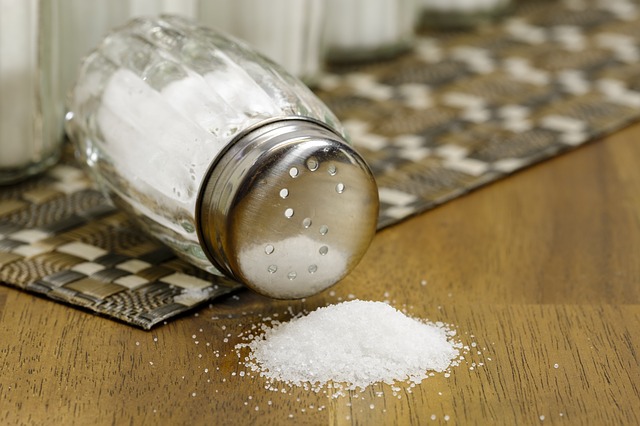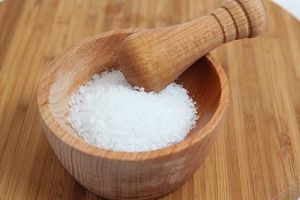
Two years ago I wrote a lengthy article on salt – its historical usage, its metabolism, and how much individual variability determines your salt need. Since that time I have become aware of more information about salt that has revealed to me that the saltshaker salt we add to our foods is not such a good idea.
I mentioned in the previous article that salt will drive up blood pressure in those people that are sensitive to it. Likewise I wrote about how folks with chronic stress can end up with adrenal glands that under function. One of the jobs of the adrenals is to control salt levels in the body by telling the kidneys to reabsorb sodium that leaks out in the urine. In fact one way to measure adrenal strength is by measuring the sodium level in the urine. If it is too high then we know the adrenals are pooped out and not doing their job. Acute stress drives the adrenals by forcing them to overproduce adrenaline and cortisol. This also drives up the hormones the adrenal produces that tell the kidneys to stop sodium from escaping in the urine So too little sodium in the urine means the adrenals are in hyper mode and too much means they have pooped out. Active stress states push up blood pressure because of the increased adrenal activation and chronic stress states lose the ability to raise blood pressure.

In spite of all this hormonal control of sodium levels in the body, eating too much salt can still cause a variety of problems. The kidneys can only dump so much salt because to dump salt requires them to dump water, and the kidneys are under even tighter control to make sure that we do not get dehydrated. So the body would rather put up with too high levels of salt than not enough water. That is part of the reason salty foods make us so thirsty – we need the water to help flush out the extra salt. But as Americans we eat way more salt than our body knows what to do with and we are generally mildly dehydrated, so we don’t get rid of the extra salt from our body.
Well shortly after my last article on salt, two important papers on salt were published that showed too much salt fundamentally alters the immune system and it promoted autoimmune disease. Other research has now shown 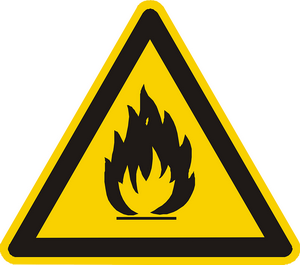 that a high salt diet triggers systemic inflammation. This is not good news.
that a high salt diet triggers systemic inflammation. This is not good news.
 that a high salt diet triggers systemic inflammation. This is not good news.
that a high salt diet triggers systemic inflammation. This is not good news.Personally I have been living in La-La land thinking that I have been restricting myself to good quality sea salt and that salty foods were ok for me because I drink plenty of water and I typically lose a lot of salt through my urine. Although I avoid most processed foods, I have been known to enjoy salted macadamia nuts and the occasional bag of potato chips cooked in avocado or olive oil. Now I find out that my arch nemesis, autoimmunity, is made worse by these very foods. I thought that staying away from all sugars, flours, grains, dairy, legumes, and vegetable oils was enough. But now even the joy of salty delights has to be eliminated. I know from past experience that trying to give up salt can be even more difficult than giving up sugar – probably because I can use stevia as a sugar substitute while there is no good substitute for salt.
In the world of science, most nutritional information is fairly suspect. Most studies are based on either rats – which are not humans – or correlational studied based on people self-reporting on what they have eaten over the last few months. Could you really remember how many chocolate bars per day you ate every day for the last few months? Even if you could, how many other dozens of other factors could have affected the outcome of the study? That is why different scientists can argue over studies and what they mean for decades. Correlation does not prove causation.
 There is one type of study that no one argues about – metabolic ward studies. Here the subjects are locked up in a metabolic hospital ward for weeks to months where every possible factor can be accounted for. Every morsel of food they eat is controlled. The amount of exercise they do is recorded and even the shampoo they use is all controlled. These studies rarely ever happen because they are insanely expensive, and when they do it, it is with maybe a dozen subjects for four to six weeks.
There is one type of study that no one argues about – metabolic ward studies. Here the subjects are locked up in a metabolic hospital ward for weeks to months where every possible factor can be accounted for. Every morsel of food they eat is controlled. The amount of exercise they do is recorded and even the shampoo they use is all controlled. These studies rarely ever happen because they are insanely expensive, and when they do it, it is with maybe a dozen subjects for four to six weeks.The salt story recently got the super royal treatment. After a short 7 day study showed that just 7 days of a high salt diet kicked up inflammatory chemical levels similar to what happens when we get an infection or have an autoimmune disease, our space program decided they needed to absolutely know what was happening. 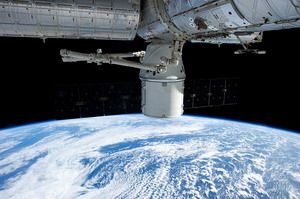 They are preparing to send men to Mars, so they need to know how much salt to have in their diets. So they set up a 205 day study under metabolic ward conditions as part of a simulated space flight program. This study conclusively proved that salt intake at the levels the average American eats every day – 10 to 12 grams – generates chronic inflammation and messes up the immune system in ways that promote cardiovascular disease, cancer, and autoimmune disease.
They are preparing to send men to Mars, so they need to know how much salt to have in their diets. So they set up a 205 day study under metabolic ward conditions as part of a simulated space flight program. This study conclusively proved that salt intake at the levels the average American eats every day – 10 to 12 grams – generates chronic inflammation and messes up the immune system in ways that promote cardiovascular disease, cancer, and autoimmune disease.
 They are preparing to send men to Mars, so they need to know how much salt to have in their diets. So they set up a 205 day study under metabolic ward conditions as part of a simulated space flight program. This study conclusively proved that salt intake at the levels the average American eats every day – 10 to 12 grams – generates chronic inflammation and messes up the immune system in ways that promote cardiovascular disease, cancer, and autoimmune disease.
They are preparing to send men to Mars, so they need to know how much salt to have in their diets. So they set up a 205 day study under metabolic ward conditions as part of a simulated space flight program. This study conclusively proved that salt intake at the levels the average American eats every day – 10 to 12 grams – generates chronic inflammation and messes up the immune system in ways that promote cardiovascular disease, cancer, and autoimmune disease.Salt and sodium naturally occurs in all foods – the least in fruits and the most in meats and vegetables. Without adding any salt to your food, if you ate a pure organic fresh food diet, you would still get 1600 to 2200mg of sodium per day. Research shows that 2300mg of sodium per day is the recommended level for optimum health. So there is not really any room for any added salt in the human diet…particularly the average diet we have today that has 5 times this salt level.
A small amount of variance in this still is appropriate for people under various kinds and lengths of stress. Obviously if your blood pressure is up, you have cardiovascular inflammation going on and you need to cut out the salt as well as the sugar, simple carbs, dairy, and vegetable oils. All these things contribute to cardiovascular disease. Since these are the main ingredients of packaged and processed foods, that strongly says “If it comes in a package, don’t eat it.”
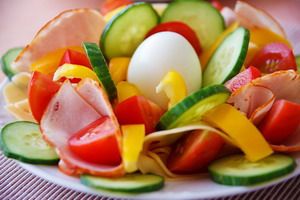 Home cooked fresh food is the answer of choice for most any disease state. With the exception of nuts, vinegars, herbs, and spices, if it can sit on a shelf, it is not a fresh food – don’t eat it. If you really want to get “old school” you could do your own canning to preserve foods, but even most home canned foods have too much salt or sugar. Even most fermented foods are made with excessive salt levels to inhibit the growth of the wrong bacteria. Choose your fermented foods carefully to get low salt varieties. The closest thing to fresh that can be stored is frozen foods and freeze dried and dried foods.
Home cooked fresh food is the answer of choice for most any disease state. With the exception of nuts, vinegars, herbs, and spices, if it can sit on a shelf, it is not a fresh food – don’t eat it. If you really want to get “old school” you could do your own canning to preserve foods, but even most home canned foods have too much salt or sugar. Even most fermented foods are made with excessive salt levels to inhibit the growth of the wrong bacteria. Choose your fermented foods carefully to get low salt varieties. The closest thing to fresh that can be stored is frozen foods and freeze dried and dried foods.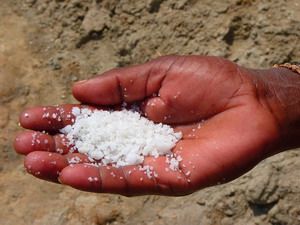 So there we have it. Salt is necessary for life, but like everything elsewhere too much is just as bad as too little. Too little water causes death by dehydration, while too much water is death by drowning. Life is a balancing act. The right amount is the right amount. Some things are poisonous at any concentration like mercury, while others only destroy us when we use too much. Alcohol is a good example. Our liver makes an enzyme for metabolizing alcohol and all cause death statistics show that a little alcohol is a good thing – one unit per day for women and 1 to 2 units for men. Most people have the built in chemistry for handling this much. But more than that quickly becomes toxic and destroys the body.
So there we have it. Salt is necessary for life, but like everything elsewhere too much is just as bad as too little. Too little water causes death by dehydration, while too much water is death by drowning. Life is a balancing act. The right amount is the right amount. Some things are poisonous at any concentration like mercury, while others only destroy us when we use too much. Alcohol is a good example. Our liver makes an enzyme for metabolizing alcohol and all cause death statistics show that a little alcohol is a good thing – one unit per day for women and 1 to 2 units for men. Most people have the built in chemistry for handling this much. But more than that quickly becomes toxic and destroys the body. Convenience foods are really only convenient for the drug companies and morticians. They are slowly killing us. Maybe the diseases these foods cause is really a wakeup call about our busy lifestyles in general. We are so busy chasing the desires of our ego that we have abandoned listening to the innate wisdom of our bodies. Modern foods are mostly drugs that push us to go faster and keep us from feeling the consequences of our choices. Our bodies are not happy with us for doing this. We are paying the price in our health as a consequence. The really sad thing is that all this running around is not making us any happier – quite the opposite. No extra amount of anything in our lives can fill the emptiness we feel. That emptiness is filled by our outflow of loving words and good deeds. Love yourselves first then spread the goodness around to everyone else.
Convenience foods are really only convenient for the drug companies and morticians. They are slowly killing us. Maybe the diseases these foods cause is really a wakeup call about our busy lifestyles in general. We are so busy chasing the desires of our ego that we have abandoned listening to the innate wisdom of our bodies. Modern foods are mostly drugs that push us to go faster and keep us from feeling the consequences of our choices. Our bodies are not happy with us for doing this. We are paying the price in our health as a consequence. The really sad thing is that all this running around is not making us any happier – quite the opposite. No extra amount of anything in our lives can fill the emptiness we feel. That emptiness is filled by our outflow of loving words and good deeds. Love yourselves first then spread the goodness around to everyone else.